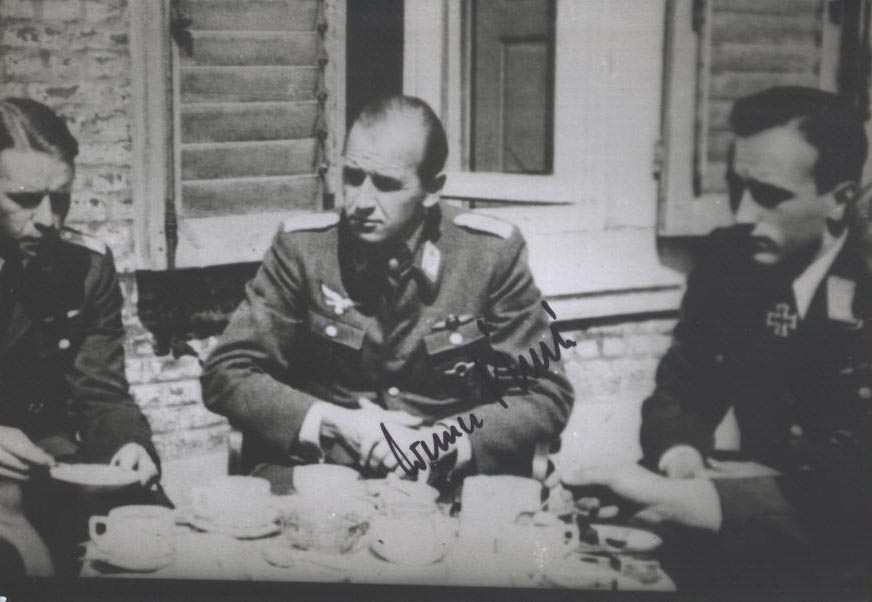
|
~SOLD~STREIB Werner
Oberst
Streib, Werner
* 13.06.1911 Pforzheim
+ 15.06.1986 München
Awarded Knights Cross: 06.10.1940
as: Oberleutnant: Staffelkapitän 2./NJG 1
Awarded Oakleaves as the 197rh Recipient : 26.02.1943 as Major
Kommandeur I./NJG 1
Awarded Swords as the 54th Recipient : 11.03.1944 as Major
Kommodore NJG 1
Served in the Bundeswehr: From 1956 to 31.03.1966
Last Rank : Brigadegeneral
Often called 'Father of the Nachtjagd' Streib helped develop the operational tactics used by the Nachtjagd during the early to mid-war years, and along with the likes of Wolfgang Falck made the Luftwaffe's nightfighter arm an effective fighting force against the Royal Air Force (RAF) bombing offensive.
Werner Streib was born on 13 June 1911 in Pforzheim Germany. After a spell in banking and finance, he joined the Wermacht as an infantryman. A transfer to the Luftwaffe, as an observer in a reconnaissance unit followed, and later he trained as a fighter pilot. In 1937, he was assigned to Jagdgeschwader 2 "Richthofen" at Jüterbog-Damm. He then became a Messerschmitt Bf-110 Zerstörer pilot in Wolfgang Falck's Zerstörergeschwader 1 as the war began.
His first victory and only daylight victory was over a RAF Bristol Blenheim on 10 May 1940. In May 1940 the creation of the Nachtjagd was commenced, and on 20 July, as part of 2./Nachtjagdgeschwader 1 (NJG 1), Werner Streib claimed his first night victory (and the first official Nachtjagd victory) over a RAF Whitley.
By October 1940 Streib was commanding of I gruppe, NJG 1, based at Venlo, Netherlands in order to more easily intercept the known RAF bomber routes into targets in the Ruhr. He would be awarded the Knight's Cross of the Iron Cross on 6 October 1940 as an Oberleutnant with eight victories claimed. By May 1941 he had 26 confirmed victories. He was awarded the Oak Leaves to his Knights Cross on 26 February 1943 as a Major and Geschwaderkommodore (wing commander) of NJG 1 with 42 confirmed victories.
On the night of 11–12 June 1943, Werner Streib flew a prototype version of the Heinkel He 219 and claimed to have shot down 5 Lancaster bombers within just 30 minutes. However, when returning to Venlo Streib misjudged the landing approach and used the flaps at too high a speed. The Heinkel crashed and was written off on upon landing, Streib and his Bordfunker (radio or wireless operator) escaping with slight injuries.
On 11 March 1944 he was awarded the Swords to his Knights Cross for 66 confirmed victories.
On 23 March 1944 he was made Inspector of Night Fighters and he would stay in this post as Oberst until the end of the war.
Werner Streib was officially credited with shooting down 66 enemy aircraft, with 65 claimed at night. He was the first night fighter pilot to be honoured with the Knight's Cross of the Iron Cross.
After the war he worked in the grocery business before joining the Bundeswehr on 16 March 1956. For three years he commanded the pilot school A in Landsberg am Lech, equipped with the T-6 Texan was responsible for training the beginner pilots in the Luftwaffe. Brigadegeneral Streib's military career ended with his retirement on 31 March 1966. His last position was Inspizient Fliegende Verbände (Inspector of Flying Forces).
He died on 15 June 1986 and is buried in Munich, Germany.
From Wikipedia, the free encyclopedia
Signed 4” x 6” postwar photo
Price: $0.00
Please contact us before ordering to confirm availability and shipping costs.
Buy now with your credit card
other ways to buy
|


